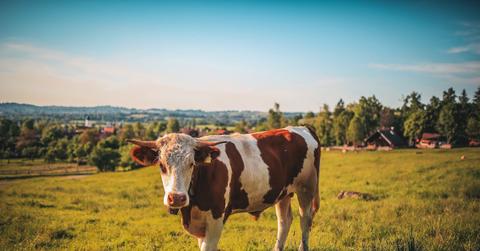Meat And Dairy Corporations Could Soon Beat Oil As World's Worst Polluters
A new report finds that meat and dairy producers are on track to surpass the oil industry's greenhouse gas emissions.
May 31 2019, Updated 12:12 p.m. ET
Bad news, bacon fans: meat and dairy producers are poised to become the globe’s biggest polluters. According to a new report from GRAIN and the Institute for Agriculture and Trade Policy (IATP), the 35 largest meat and dairy corporations could take that title “within the next few decades” unless they dramatically reduce production.
The research found that the five biggest corporations — Tyson, Cargill, JBS, Dairy Farmers of America, and Fonterra — already contribute more greenhouse gas emissions annually than ExxonMobil, Shell, or BP. And they’re doing very little to change that. GRAIN and IATP report that only half of the top 35 meat and dairy companies have announced any concrete emissions targets, and that most fail to report their emissions accurately.
“The industrial livestock and dairy sectors are major contributors to climate change, but they have generally escaped scrutiny because they either don’t collect information about their impacts, or they don’t take credible action on the basis of what they know,” Oliver De Schutter, a former UN special rapporteur on the right to food, says in the press release.
If these corporations continue operating as usual, the livestock sector alone could swallow 80 percent of the planet’s annual greenhouse gas emissions budget by 2050, the research claims.
“There is no such thing as ‘cheap meat,’” Shefali Sharma, director of the IATP European office, says in the release. “For decades, the mass production of meat and dairy has been enabled by farmers getting paid below the cost of production, workers being exploited and taxpayers footing the bill for air, land, and water pollution caused by big meat and dairy.
It’s time we realized over-consumption is directly linked to the subsidies we provide the industry to continue deforesting, depleting our natural resources, and creating a major public health hazard through antibiotic overuse. This report shows what a key role they play in creating climate change as well.”
The new report backs up other studies examining the environmental impact of meat and dairy farming. On June 1, the journal Science published findings from nearly 40,000 farms in 119 countries, concluding that eating vegan was the single biggest way individuals could help the planet. In their 2015 book Cowed, Denis Hayes and Gail Boyer Hayes claim that eating a pound of beef has a worse impact on the planet than burning a gallon of gasoline.
GRAIN and IATP have also released previous studies on “big meat and dairy.” Last year, they reported that the top 20 producers emitted more greenhouse gas emissions in 2016 than all of Germany.
“There’s no other choice. Meat and dairy production in the countries where the top 35 companies dominate must be significantly reduced,” Devlin Kuyek, a researcher at GRAIN, says in the press release.
Some of those producers have announced plans to lessen their impact. For instance, Tyson is aiming for a 30 percent greenhouse gas reduction by 2030, while Cargill is working towards 10 percent by 2020. But researchers at GRAIN and IATP say they’re misreporting their progress by excluding supply chain emissions from their targets, which “generally account for 80-90% of meat and dairy emissions,” according to the report.
GRAIN and IATP suggest it will take nothing short of a “movement” to reverse this trend. But De Schutter says changes in government policy, ones that are less friendly to large meat and dairy corporations, are a vital starting point. “This report should encourage governments to take action to stem their further expansion,” he says in the release.


